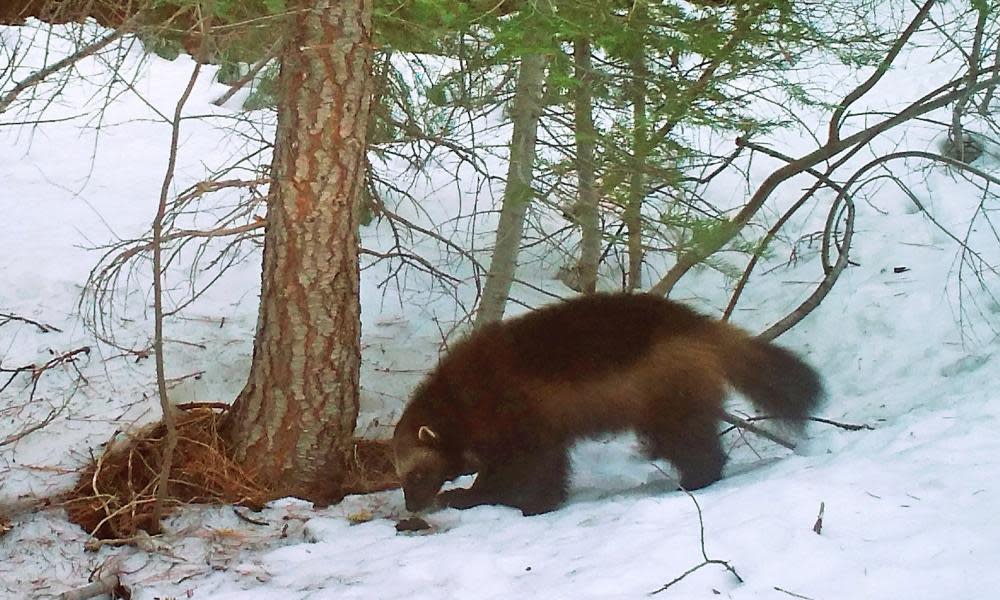Wolverines to gain US federal protection as climate crisis threatens habitat

The North American wolverine, a species from the badger family that resembles a small bear with a bushy tail, will receive government protections under a Biden administration proposal after scientists warned that its harsh, prairie mountain habitat was being threatened by climate change.
The proposal by the US Fish and Wildlife Service to grant wolverines, sometimes called “mountain devils”, federal protections under the Endangered Species Act brings a close to 30-year fight by conservation groups who first petitioned for the species to be listed as threatened in 1994.
Related: Western gray squirrel placed on endangered list in Washington state
“Current and increasing impacts of climate change and associated habitat degradation and fragmentation are imperiling the North American wolverine,” said the service’s Pacific regional director, Hugh Morrison, in a press release. “Based on the best available science, this listing determination will help to stem the long-term impact and enhance the viability of wolverines in the contiguous United States.”
Last year, a federal judge in Montana gave wildlife officials 18 months to decide if wolverines should receive protections following years of dispute over the risks climate change and other threats posed to the rare and elusive predators.
That order came after environmentalists challenged a 2020 decision by the Trump administration to withhold protections despite no more than 300 being thought to remain in the lower 48 states, primarily in fragmented, isolated groups at high elevations in Montana, Wyoming, Idaho and Washington state.
Wolverines are the world’s largest species of the mustelid family, which includes, alongside badgers, weasels, otters and martens. They join a growing number of animals, plants and insects that officials say are at growing risk as the climate crisis alters temperature and rainfall patterns.
“This long-awaited decision gives the wolverine a fighting chance at survival,” said Timothy Preso, an Earthjustice attorney who represented conservation groups in the long-running legal campaign to protect the wolverine. “There is now hope for this icon of our remaining wilderness.”
According to a study in central Idaho, wolverines need immense ranges of wildland, as much as 610 square miles, to survive. Trapping and poisoning in the early 1900s initially decimated the species. At least 10 wolverines have been accidentally captured in Montana since trapping was banned in 2012.
Over the three decades since the protection of wolverines was first proposed by environmentalists, they have become emblematic of the push-pull between conservationists, federal wildlife officials and lawmakers.
The wildlife service received a petition to protect wolverines in 2000 and the agency recommended protections in 2010. The Obama administration proposed protections and later sought to withdraw them but was blocked by a federal judge who said in 2016 that the snow-dependent animals were “squarely in the path of climate change”.
Some Montana Republicans had petitioned the Biden administration to delay the latest decision, arguing that scientists’ estimates of the climate change dangers to wolverine habitat were too imprecise.
Led by the hard-right conservative congressman Matt Rosendale, they warned that protections could lead to future restrictions on activities allowed in wolverine habitats, including snowmobiling and skiing.
“Whether it’s private property, state property or federal property, if we are limited on the use of that land based upon this status, that’s a taking,” Rosendale said Wednesday. “Is the federal government going to compensate the state for lack of use on state-owned lands? … I don’t think so.”
Fish and Wildlife Service officials have said they are “not concerned” about the effects of existing developments such as ski resorts since wolverines probably already avoid those areas. In another complication, government scientists conceded they were uncertain how quickly wolverine habitat might disappear due to climate change.
“The best available information suggests that habitat loss as a result of climate change and other stressors are likely to impact the viability of wolverines in the contiguous US through the remainder of this century,” they concluded.


